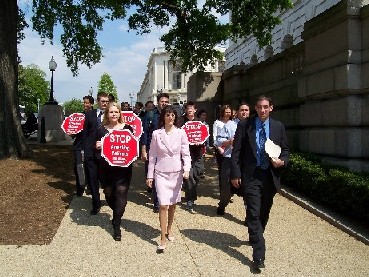Feature:
Angel
Raich
Tries
Again
on
Medical
Marijuana,
But
Judges
Sound
Skeptical
3/31/06
Oakland medical marijuana patient Angel Raich was back in court Monday seeking an injunction to win protection from federal law enforcers who do not recognize her right to use her medicine, but skeptical questioning from a three-judge panel at the US 9th Circuit Court of Appeals suggests she will have an uphill battle.
But that decision left unsettled other issues raised by Raich and her attorneys, Randy Barnett and Robert Raich. (Monson has dropped out of the case.) Among them are how and whether the "medical necessity" defense might apply to medical marijuana patients and a closely related argument that the US Constitution guarantees them a fundamental right to make life and death decisions about their own lives. Those were the issues argued Monday. The case file includes uncontested testimony that Raich, who suffers from a variety of ailments, including an inoperable brain tumor, would suffer greatly and die of starvation if deprived of marijuana. Raich's personal physician included a sworn statement to that effect. "Doctors, not the federal government know what's best for their patients," said Barnett, a professor of law at Boston University, before the oral arguments. "If a state decides to allow doctors to recommend proven treatments for their patients, then the federal government has no rightful place in the doctor's office." "This case implicates perhaps the most fundamental right of all, the right to preserve one's life," said Robert Raich. "It also implicates the fundamental right to alleviate unnecessary pain and agony and protect bodily integrity." The case is about Raich's "fundamental right to life," Randy Barnett told the court. Both the 5th and the 9th Amendments, as well as the doctrine of medical necessity, protected that right, he told the three-judge panel, according to an on-scene report provided by California NORML director Dale Gieringer. But panel member Judge Arlen Beam immediately challenged Barnett, asking whether Raich even had standing to bring the case. Beam noted that Raich had not been arrested or prosecuted or even threatened with prosecution. Judges Richard Paez and Harry Pregerson then jumped in, asking if any other patients had been prosecuted, a question for which Barnett did not have a ready answer. According to California NORML, dozens of people operating under the state's medical marijuana law have been prosecuted by federal authorities, but almost all of them involved growing or distributing medical marijuana for others, not mere possession by patients. Judge Pregerson questioned whether Raich's medical necessity claim was even valid given that she had not been arrested or prosecuted. Perhaps, he suggested, the appropriate way for Raich to raise the issue would be to get arrested and then use the defense. That a patient would be arrested solely for being a patient would be "incredibly unlikely," said Assistant US Attorney Mark Quinlivan, who argued the case for the government, although he refused to rule out the possibility, especially if patients "flaunted" their use. "The federal government has always focused on large-scale distributors and growers," he said. Raich could have a winning case if she were arrested, suggested Judge Beam. "I'd be amazed if the Supreme Court didn't think the evidence would carry the day," he said. "The problem is, we don't have standing in my view on this particular question." It is Raich's rights under the 5th Amendment's due process clause and the 9th Amendment's protection of an individual's ability to make life-shaping decisions, preserve bodily integrity, avoid severe pain, and even stay alive that are the primary issue, Barnett responded. The federal government's enforcement of the drug laws in a manner that unduly burdens Raich must be found unconstitutional, he argued. "Medical cannabis is necessary for the preservation of Angel Raich's life," said Barnett. "If she obeys the law, she will die." There is no right to use drugs the government has banned, Quinlivan retorted, leading Judge Pregerson to challenge him. "Supposing that a patient faced unbearable suffering that could only be relieved by a pill that was on the government's black list, would not that patient have a right to use the drug?" Well, no, Quinlivan responded. In the end, he said, it comes down to a determination by Congress, and Congress had determined that marijuana had no medical use. An adverse ruling would open the floodgates to "people who want to use other substances," he warned. When Judge Pregerson asked Quinlivan if was okay to just let Raich die, Quinlivan responded, "Congress has made that value judgment." While oral arguments are not absolute predictors of forthcoming rulings, they are generally good indicators, and the indications are the 9th Circuit panel has serious questions about Raich's latest legal argument. However the 9th Circuit panel rules, the case is headed for the US Supreme Court, which has so far shown little indication it is prepared to rule favorably in a medical marijuana case. But it has not yet heard the arguments raised by Raich. As for Angel Raich, she remains hopeful. "I fear for my health, my safety and my family, but I am confident that the 9th Circuit Court of Appeals will again agree that I am in every way acting in accordance with the law," she said. "I just want the opportunity to be a mother to my children without having to live in constant fear that the federal government will raid my home or throw me in jail simply for taking the medicine that treats my pain and keeps me alive."
|

